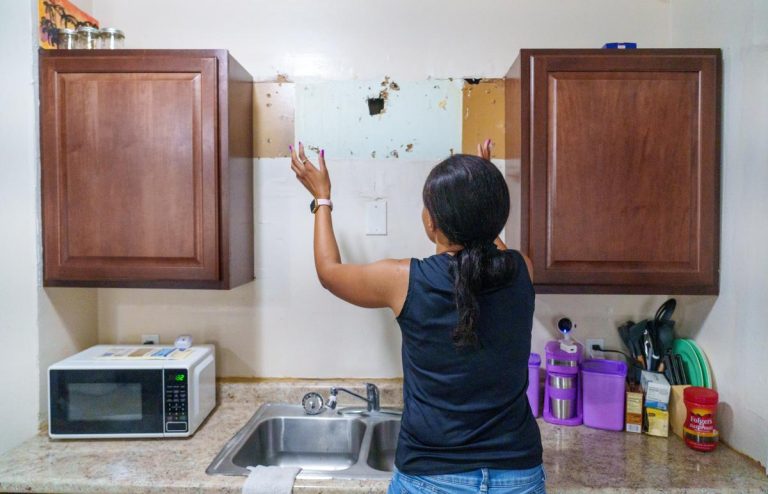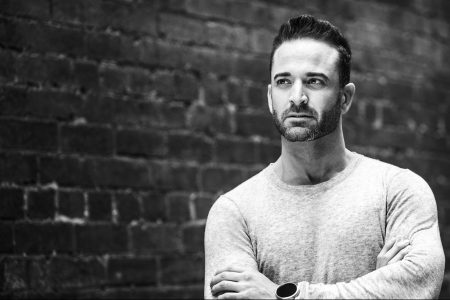This is the second in a series investigating the impact on Indianapolis homeowners and renters of corporations that buy up large numbers of homes and convert them into rentals.
Ayanna White, 32, moved out of her home for almost three months because her heat wasn’t working in the dead of winter, but said her landlord still demanded she pay rent.
Scheree Robinson’s air conditioning broke in the peak of summer, the stifling heat unbearable, but her landlord told her fixing it was not a priority, she said.
Nancy Hernandez, 22, and her mother, 40-year-old Eloisa Aguilar, discovered the strange sounds and foul smell they’d noticed after they moved into their rental house were from a raccoon infestation in their attic and open sewage leaking into their ventilation, respectively.
These are the experiences of Indianapolis tenants who rent from VineBrook Homes, one of the city’s largest corporate homeowners. But VineBrook, a Dallas-based real estate investment trust, isn’t just a landlord. It’s one of several out-of-state institutional investors buying up homes in Indianapolis with often unbeatable cash offers and flipping them to rent, squeezing an already-tight real estate market in neighborhoods where it’s dominant, and pricing out low to moderate-income homebuyers.
Instead of being someone’s dream home, many of these houses have become a renter’s nightmare.
IndyStar, part of the USA TODAY Network, combed through 40,000 housing code violation cases from 2018 to July 2023, which catalog the worst problems in rental homes, so severe that the Marion County Public Health Department had to step in. The data shows:
-
Of Indianapolis’ 11 biggest corporate homeowners, the three worst violators were VineBrook Homes, Indianapolis-based SLB Investments LLC and New York City-based private equity firm Cerberus Capital Management, whose property management wing, FirstKey Homes, manages the rentals.
-
Together, these three companies were responsible for at least 620 housing violation cases. Each case represents at least one housing code violation at a rental home on a given date.
-
VineBrook Homes, which IndyStar found owns at least 1,400 homes in Indianapolis, had by far the most violation cases, at 269, with 108 in the first seven months of 2023 alone. That is one violation case every two days, almost, on average.
-
In 2023, the three worst violators all hit a five-year record high in violation cases: Cerberus, which IndyStar found owns at least 1,700 houses in Indianapolis, had 53 in the first seven months of 2023 while SLB Investments LLC, which IndyStar found owns at least 800 houses in the city, had 88.
-
Problems often started only after the investor took over. Of the violation cases that the 11 biggest corporate owners were responsible for, 59% happened in homes that had no housing violations in the past decade until the investor took over, an IndyStar analysis of 1,300 housing code violations at those addresses from 2013 to 2023 found.
IndyStar spoke with a dozen VineBrook Homes tenants who detailed unlivable conditions from lack of heat to mold to vermin. What tenants shared amounted to a pattern of glacial maintenance response times and shoddy fixes. Based on VineBrook’s Securities and Exchange Commission filings, tenants and comparisons with the work of four affordable housing developers, the company’s business model appears to rely on keeping rehab and maintenance costs low while generating as much revenue as possible.
Together with the data, the tenants’ stories indicated that the worst corporate investors are responsible for hazardous housing conditions in homes they purchase and rent out.
“It was like living in a third-world country,” Robinson, 44, said. “It was like living under a slumlord. This ain’t America, that’s how I felt.”
American dream? Homebuyers outbid in droves by investors
In response to a detailed list of questions about the conditions reported by their tenants, VineBrook responded with a statement claiming that emergency maintenance requests in the past three years took a little less than a day on average to resolve and routine requests took seven to 10 days.
“Obviously, with a high unit count of older properties, repairs and violations naturally do arise within the VineBrook portfolio as homes age with use over time,” the VineBrook statement stated, adding that the company makes timely repairs, minimizes violations and works with tenants and local governments to prevent issues.
But the data shows about 12% of VineBrook’s 1,400 Indianapolis homes had problems in the past five years that went unaddressed for so long or were so egregious that the health department had to step in.
In some cases, it took multiple visits from health department inspectors to resolve the issue.
VineBrook also argued that they are transforming housing that was not habitable into homes for rent.
“VineBrook was founded on a vision to acquire and restore distressed properties with an eye for helping to rejuvenate neighborhoods and providing workers and families with access to safe, affordable single-family homes,” a VineBrook company statement to IndyStar stated.
Indeed, many large corporate investors buy homes that are in need of repair, renovating them and thus driving up their value, a report by Urban Institute found. But IndyStar found that the quality of a significant number of renovations were at times, suspect, and at worst, nonexistent.
FirstKey Homes and SLB Investments both said in separate statements to IndyStar that they think the number of violations at their homes is low.
“No housing violation is acceptable, and it is the goal of the Companies to eliminate them; however, the complete elimination is not realistic,” Grover Davis, an attorney for SLB Investments, said.
Although the company racked up dozens of housing violations in the first half of 2023, FirstKey Homes said the number of violations relative to the number of houses their parent company owns in Indianapolis is low. But, the statement added, even one violation is unacceptable.
Even so, the housing code violation data is just the tip of the iceberg, as reporting a violation to the health department is often the last form of recourse for tenants who’ve exhausted every other option.
Lower-income renters hit worst
On one hand, the majority of homes rented out by these investors aren’t in terrible condition. In general, professional rental companies can also rehab homes more cheaply and efficiently because they can order supplies in bulk to save money, Michael Hicks, an economics professor at Ball State University, said.
On the other hand, IndyStar found that institutional investors that cater to lower income renters tend to have more housing code violations than those that rent out more expensive, often luxury, homes.
The violations also tend to be concentrated in lower-income neighborhoods on the far east side and west side.
For instance, VineBrook Homes, whose Indianapolis homes had an average rent of $1,210 as of July 2023, according to the company, well below the city’s average rent of about $1,530 for houses as of June 2023, according to John Burns Research and Consulting data.
The company’s rental houses had six and a half times more violations than the higher-end homes rented by Las Vegas-based AMH, formerly American Homes 4 Rent, in a five-year period, which had an average nationwide rent of $2,014 as of March 2023.
Renting houses for relatively affordable rates is often at odds with quality maintenance.
This leaves the lowest-income renters stuck between a rock and a hard place: to rent a home they can afford in the neighborhoods where they work and where their kids attend school, they often have to reckon with an unresponsive landlord and bad living conditions.
And despite the hazardous conditions tenants face, Jeff Bennett, who was until recently senior policy advisor to the mayor, said it can be difficult for the Marion County Public Health Department to collect fines from noncompliant property owners for housing violations because of the limited enforcement tools they have at their disposal.
Indiana’s lack of tenant protection laws — including the inability of tenants to withhold rent when landlords refuse to make necessary repairs or to deduct repair costs from their rent — gives landlords like VineBrook, which owns more than 24,000 houses across the country, outsized power.
VineBrook boasted in its 2022 annual report that “We believe we are the largest SFR operator in the country specializing in workforce housing, defined as housing that costs less than $1,400 per month.”
But for some, VineBrook’s comparatively affordable rents are cold comfort. For Aguilar, the renter who discovered the raccoons in her attic, the problems were one thing. Being disrespected was another. She said she felt property managers didn’t take her concerns about her home seriously because she’s Hispanic and doesn’t speak much English.
“Even animals were treated better,” Aguilar said, with her daughter translating. “We were practically treated like animals.”
The ‘lipstick rehab’ model
When you walk into White’s home on the east side, you’ll notice a gaping hole above her kitchen sink in stark contrast to the photos of her children, Xavier, Elijah and Aaliyah, plastered to a nearby wall.
It was left there by a heavy wooden cabinet that fell from the wall and struck White in the head — and that was the second time it had fallen after being repaired. The cabinet had no anchors to hold it in place and wood screws were used to attach it to drywall.
“One of my kids could have got killed,” she said.
VineBrook’s business model involves buying up houses, implementing what one tenant called a “lipstick rehab,” or cosmetic repairs and flipping the homes to rent.
The company’s chief financial officer and president, Brian D. Mitts, wrote in an April 2023 letter to shareholders that VineBrook invests in home rehabs and reintroduces higher quality homes into the housing supply at affordable prices.
But the volume of housing violations at VineBrook homes, testimonies from tenants, and data on how much they spend on rehabs suggests otherwise.
According to a 2022 Securities and Exchange Commission filing from VineBrook, the company spent an average of $25,286 to rehab nearly 7,000 homes in 2022. David Howard, president of the National Home Rental Council, said professional rental operators spent, on average, $27,000 to repair and renovate homes in the first quarter of 2023.
By comparison, Intend Indiana, an affordable housing developer in Indianapolis which also buys and rehabs homes to sell to low-income buyers, often in competition with corporate investors like VineBrook, spent an average of $60,164 to rehab a home in 2022, according to data the organization provided to IndyStar.
The Indianapolis Neighborhood Housing Partnership and Near East Area Renewal, or NEAR, told IndyStar they spend well above $200,000 to totally gut and rehab homes to sell to low-income buyers.
A high-quality home rehab is expensive and time-consuming even for developers like Intend Indiana that do not seek profits on the homes. These nonprofit developers often rely on grants to keep homes affordable — NEAR uses at least $50,000 in federal grant money per rehab, executive director John Franklin Hay said.
But the rehabs are intended to last. Intend Indiana’s rehabs generally involve a full interior gut of the home, a complete remodel of kitchen and bath areas and replacement of AC, furnaces, the roof and siding, CEO of Intend Indiana, Steven Meyer, said.
“(These investment companies) are absolutely buying (houses) as is and renting them as is with very little investment into the house, and then the rents are at the top of the market for those areas,” Meyer told IndyStar.
That lack of investment shows. White said she noticed major red flags even before she moved into her home last July — most urgently, that her air conditioning wasn’t working.
“The day I signed my lease, they brought me out a window AC temporarily and told me they would be back within a week because of a holiday,” she said. “They never worked on the air conditioning.”
It would be nearly a year after she moved in before White’s air conditioning was finally fixed.
Tenants showed IndyStar evidence of bad conditions in VineBrook homes soon after moving in, even as the company claimed those very homes were in good condition.
In March 2021, VineBrook acquired 493 Indianapolis homes from Conrex Residential, a Charleston, South Carolina-based company, at a significant discount as a result of the COVID-19 pandemic, according to the company’s July 2023 investor presentation.
“We intend to renovate less than 0.4% of the homes acquired” because “99.6% of homes were generally in good condition,” VineBrook declared in a 2021 SEC filing about the Conrex acquisition.
However, at least three tenants IndyStar visited lived in those very homes taken over by VineBrook.
All three homes had never reported housing violations before 2021.
All three tenants filed housing violations after VineBrook’s takeover: flooding, plumbing problems, no AC, sewage leaking into the bathroom.
Robinson moved into her west side home when Conrex still owned it. Halfway into her two-year lease, VineBrook took over.
“It started with bullying,” she said, as they were hiking her rent even though she had a preexisting lease with Conrex. “They were saying, ‘we’re going to put you out.’”
Then, her washer and dryer started leaking. The water damaged the floor, causing her ceiling to sag so badly that she was afraid of it collapsing. She told IndyStar VineBrook took nearly six months to address the problem.
“I pay my rent. I’ve been here for years,” Robinson said. “I do everything I’m supposed to do, and that’s how you treat me.”
Meanwhile, VineBrook brought in $84.5 million in rental profits in the first quarter of 2023, spending just $18 million on property operating expenses, according to its March 2023 SEC quarterly report.
VineBrook spends less, tenants pay more
But it’s not just the problems like dangerously-installed cabinets and broken air conditioning units that tenants repeatedly reported to IndyStar.
Many also spent hundreds of extra dollars on fixes that Indiana landlords are technically required to address under the habitability statute but that VineBrook failed to make in a timely manner.
It goes back to the fine print in the leases signed by these tenants, of which IndyStar reviewed three current copies.
VineBrook’s lease requires tenants to sign away basic protections that Indiana University law professor Fran Quigley, who reviewed the lease, said appear to be contrary to Indiana law.
For instance, the VineBrook lease disavows “express or implied warranties” about the home’s condition, says tenants are responsible for “small cost repairs,” denies responsibility for providing or paying for alternative housing if the home is rendered uninhabitable for any reason and says that, except for termites, tenants are responsible for pest control.
“This lease issued by VineBrook attempts to disavow its legal obligation to provide a habitable home,” Quigley said. “Both directly and indirectly, this lease misleads tenants about their rights under Indiana law.”
VineBrook disagreed with Quigley’s analysis, saying it “disregards the context of the lease and provisions in their totality.”
“VineBrook performs extensive diligence on every home it purchases, statements to the contrary are uniformed and false,” a company statement said.
The company is being sued in Cincinnati, Ohio, by the Legal Aid Society of Great Cincinnati representing tenants over these very lease terms, which the lawsuit alleges is illegal under Ohio law.
Regardless, tenants end up paying the price in more ways than one.
White, her three children and her cat were forced to move out because their heat wouldn’t work in the dead of winter with no compensation from VineBrook, she told IndyStar. During this time, White had to pay rent to two landlords, VineBrook and her dad, who her family stayed with for almost three months.
“That was really, really rough for my kids,” she told IndyStar.
DaWaun Lee, 44, told IndyStar he had to keep his furnace on at all times for months because if he turned it off, it wouldn’t turn back on.
This high level of electricity use resulted in a $1,200 utility bill. And while he requested multiple times that his furnace be repaired, he said VineBrook dragged its feet, implementing patchwork fixes and not addressing the root of the problem.
“They’ll take your money — your rent,” he said. “They’ll try to evict you, but won’t fix what they need to fix.”
Barriers to enforcement
Despite the hazardous conditions thousands of Indianapolis renters face under institutional landlords, legal barriers can hinder attempts to hold these landlords accountable.
“Ensuring the county, the public health department, has the strongest possible tools for code enforcement and for collection is really important because simply going to court is one thing, but what happens after that if they don’t comply?” Bennett said.
Under status quo, the best the health department can do is slap a noncompliant landlord with a fine, which the entity can often ignore, especially if the investor is out of state, according to a 2023 report from IU law student Jacob Purcell, but lacks more powerful tools.
If the property owner refuses to appear in court, then the health department can then take further action, either through requesting court-imposed fines, which can go up to $2,500 per offense per day, orders to clean the property or orders to vacate it.
But if the owner still refuses to comply, it’s up to the court to decide how to proceed. And in Indianapolis, numerous repeat offenders, such as the now-banned JPC Affordable Housing Foundation, got away with racking up hundreds of violations for years, seemingly without consequence.
Tenant attorneys also said Indiana’s lax tenant protection laws attract real estate investors.
“It is well-documented that national and international-level entities that aim to extract as much money as possible from rental housing are on the lookout for states and cities that give tenants very few protections,” Quigley, the housing law expert, said.
“Indiana and Indianapolis, with our lack of tenant protections under law and weak enforcement of housing code requirements, provide the perfect breeding ground for out-of-state investors to swoop in and exploit Hoosier renters,” he continued.
Several VineBrook tenants told IndyStar they attempted to withhold rent due to the hazardous conditions inside their homes. Despite years of action from activists and lawmakers, Indiana is one of only six states that doesn’t allow tenants to withhold rent or deduct repair costs from rent payments when a landlord fails to address issues in a timely way.
Bills that attempted to codify these rights died at the hands of the Indiana General Assembly’s Republican supermajority during both the 2022 and 2023 legislative sessions.
The cold, the flooding, the falling cabinet — White is willing to endure this for now. She’s even re-signed her lease with VineBrook. She sees it as a temporary sacrifice that will hopefully help her fulfill the lifelong dream of owning a home.
But as corporate investors, including VineBrook, continue to expand into new neighborhoods, the American dream of homeownership is increasingly out of reach for many. As families find they cannot compete with Wall Street, they’re forced to trade the dream of a title deed with a lease.
The Hernandez and Aguilar family thought the VineBrook rental home could be their way forward, a path out of the cramped, noisy apartment they’d rented for years.
“We came here thinking that it would be a great idea to rent a home,” Hernandez, Aguilar’s daughter, told IndyStar. “We had our own backyard, we could cook out there. We could ride bicycles or just have the kids over there playing. But then this issue started.”
“We thought it was gonna be better,” she continued, “and it turned out worse.”
Contact business reporter Claire Rafford at 317-617-3402 or email [email protected]. Follow her on Twitter @clairerafford.
Contact IndyStar reporter Ko Lyn Cheang at [email protected] or 317-903-7071. Follow her on Twitter: @kolyn_cheang.
This article originally appeared on Indianapolis Star: Rotten rental: Big investors found with hundreds of housing violations
Read the full article here









